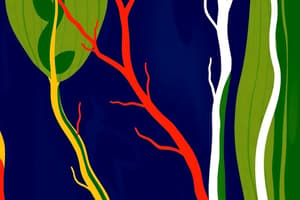Podcast
Questions and Answers
How does a plant grow?
How does a plant grow?
Plant growth involves cell division, elongation, and differentiation, contributing to the development of roots, stems, and leaves.
How important is water to plants?
How important is water to plants?
Water is essential for photosynthesis, nutrient transport, and maintaining plant structure.
How do plants transport food to their systems?
How do plants transport food to their systems?
Plants transport food through the phloem, while water and nutrients are transported through the xylem.
What are the two main types of vascular tissue in plants?
What are the two main types of vascular tissue in plants?
What are the 17 essential elements identified for plant nutrition?
What are the 17 essential elements identified for plant nutrition?
What are growth promoters in plants?
What are growth promoters in plants?
What are growth inhibitors in plants?
What are growth inhibitors in plants?
Who are two known Filipinos that contributed to plant reproduction and biotechnological applications?
Who are two known Filipinos that contributed to plant reproduction and biotechnological applications?
What is the primary role of xylem in plants?
What is the primary role of xylem in plants?
Which of the following plant hormones is primarily responsible for promoting cell elongation?
Which of the following plant hormones is primarily responsible for promoting cell elongation?
What function do root nodules serve in some plants?
What function do root nodules serve in some plants?
Which of these elements is NOT considered essential for plant nutrition?
Which of these elements is NOT considered essential for plant nutrition?
How do phloem and xylem differ in their functions?
How do phloem and xylem differ in their functions?
What is a primary factor that influences the efficiency of a plant's transport system?
What is a primary factor that influences the efficiency of a plant's transport system?
What is one of the key roles of plant hormones in growth regulation?
What is one of the key roles of plant hormones in growth regulation?
Which process primarily uses the plant's transport system to move nutrients?
Which process primarily uses the plant's transport system to move nutrients?
In what way do growth inhibitors affect plant growth?
In what way do growth inhibitors affect plant growth?
Which of the following statements about plant reproduction is inaccurate?
Which of the following statements about plant reproduction is inaccurate?
Flashcards are hidden until you start studying
Study Notes
Plant Growth and Development
- Plants grow through a combination of cell division and elongation, utilizing energy from photosynthesis.
- Growth occurs at specific sites called meristems, which are regions of active cell division.
Importance of Water to Plants
- Water is essential for various physiological processes, including photosynthesis, nutrient transport, and temperature regulation.
- It constitutes a significant portion of plant tissue and aids in maintaining turgor pressure for structural integrity.
Transport System in Plants
- Plants have a vascular system, consisting mainly of xylem and phloem, to transport water, nutrients, and food.
- Xylem: Responsible for transporting water and minerals from roots to other parts of the plant.
- Phloem: Transports organic nutrients, particularly sugars produced during photosynthesis, to different plant tissues.
Plant Nutrition
- Seventeen essential elements identified by botanists are crucial for plant nutrition, including macronutrients (like nitrogen and potassium) and micronutrients (such as iron and zinc).
- Adequate nutrition supports processes like growth, reproduction, and disease resistance.
Plant Hormones, Responses, and Feedback Mechanisms
- Plant hormones (such as auxins, gibberellins, and cytokinins) play critical roles in regulating growth, development, and responses to environmental stimuli.
- Growth Promoters stimulate growth and development, while Growth Inhibitors slow down or halt growth processes.
Reproduction and Modern Biotechnological Applications
- Advances in plant biotechnology have led to improved crop varieties, pest resistance, and higher yields.
- Filipino scientists have significantly contributed to plant biotechnology, enhancing agricultural practices and sustainability.
Plant Growth and Development
- Plants grow through a combination of cell division and elongation, utilizing energy from photosynthesis.
- Growth occurs at specific sites called meristems, which are regions of active cell division.
Importance of Water to Plants
- Water is essential for various physiological processes, including photosynthesis, nutrient transport, and temperature regulation.
- It constitutes a significant portion of plant tissue and aids in maintaining turgor pressure for structural integrity.
Transport System in Plants
- Plants have a vascular system, consisting mainly of xylem and phloem, to transport water, nutrients, and food.
- Xylem: Responsible for transporting water and minerals from roots to other parts of the plant.
- Phloem: Transports organic nutrients, particularly sugars produced during photosynthesis, to different plant tissues.
Plant Nutrition
- Seventeen essential elements identified by botanists are crucial for plant nutrition, including macronutrients (like nitrogen and potassium) and micronutrients (such as iron and zinc).
- Adequate nutrition supports processes like growth, reproduction, and disease resistance.
Plant Hormones, Responses, and Feedback Mechanisms
- Plant hormones (such as auxins, gibberellins, and cytokinins) play critical roles in regulating growth, development, and responses to environmental stimuli.
- Growth Promoters stimulate growth and development, while Growth Inhibitors slow down or halt growth processes.
Reproduction and Modern Biotechnological Applications
- Advances in plant biotechnology have led to improved crop varieties, pest resistance, and higher yields.
- Filipino scientists have significantly contributed to plant biotechnology, enhancing agricultural practices and sustainability.
Studying That Suits You
Use AI to generate personalized quizzes and flashcards to suit your learning preferences.




